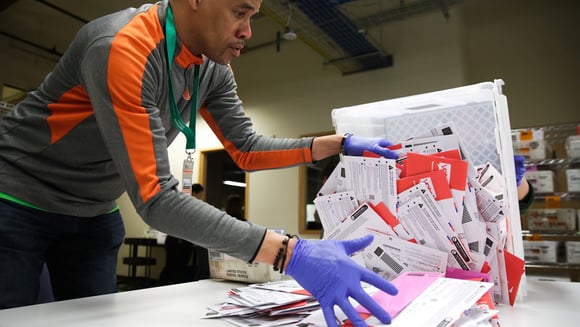The coronavirus hasn’t upended Steve and Courtney Adcock’s life when it comes to social distancing measures — they live in the middle of the Arizona desert. But the market SPX, -3.06% volatility associated with the spread of the infectious disease has shaken their ground.


The Adcocks are part of the FIRE movement — short for “financial independence, retire early.” The couple, who retired in their 30s after working technology jobs, had saved more than $1.2 million, but now has around $1 million because of market volatility linked to the coronavirus, as well as fears of a shuttering global economy and oil price wars.
They know what not to do — check their portfolios incessantly.
“We don’t need that constant feedback and we don’t want it,” Steve said. “We are not glued to our net worth. We don’t care too much about how our numbers are going down in the short-term because we know this is a blip.” Normally, they check their accounts once or twice a month.
See:Is quarantine like early retirement? These people think so
And they know what they need to do — use their emergency savings, of which they have three years’ worth of living expenses socked away, and dial down discretionary spending.
This doesn’t mean checking in on investments is a bad thing. Some people rely on those regular check-ins to feel better about where they stand financially. “It is a risk to never look at it,” he said. “For us, we tend to look every couple of weeks just to get a feel for where it’s going.”
For them, and others on the path to FIRE, the key is to focus on the long haul. “When you invest in any investment — stock market, real estate or business — they tend to be long-term investments,” Steve said, noting this is especially important for retirement savers, as they’re saving for decades of their life.
Some argue this pandemic may extinguish the FIRE movement. People who pursue this lifestyle are often investing much of their assets into equities, which are riskier and can severely lower an account balance during volatility. But Adcock said he thinks this will rejuvenate the movement. “This environment has shown a lot of people there is more to life than making money and having a good job,” he said. “I’m sure this time last year, people losing jobs and getting sick was the last thing on their minds, but as we have seen, things can change on a dime.”
The coronavirus crisis has caused mass chaos and distress for millions of Americans. Many workers were already underprepared for retirement, but the pandemic has led to record high levels of unemployment, lost or lowered wages and a nightmare health scare. Some wonder if the market downturn and the wavering economy will derail their retirement goals.
People will have to make changes — about how they spend, save and invest — but they will do so with the long-term picture in mind, Adcock said. For them, quarantining is relatively easy given they live so far apart from their neighbors, but they’re tweaking their lifestyle in other ways. Aside from passive income, they have side jobs in blogging and freelance writing, including as a contributor for MarketWatch. They’ve also pared back their discretionary spending. “We have a good baseline understanding of what will make us happy and we will spend handsomely on those things,” he said.
FIRE is not for everyone, Steve said, so he doesn’t try to push the concept of early retirement on others. But he does encourage everyone try to accomplish the “financial independence” part, which can help during dark or uncertain times. “If you no longer like your job next year and if you are financially independent or close to it, you can choose to do something else with your time,” he said. “You have no idea what’s going to happen in the future and if you are financially independent, that gives you a lot of choices.”
Originally Published on MarketWatch
